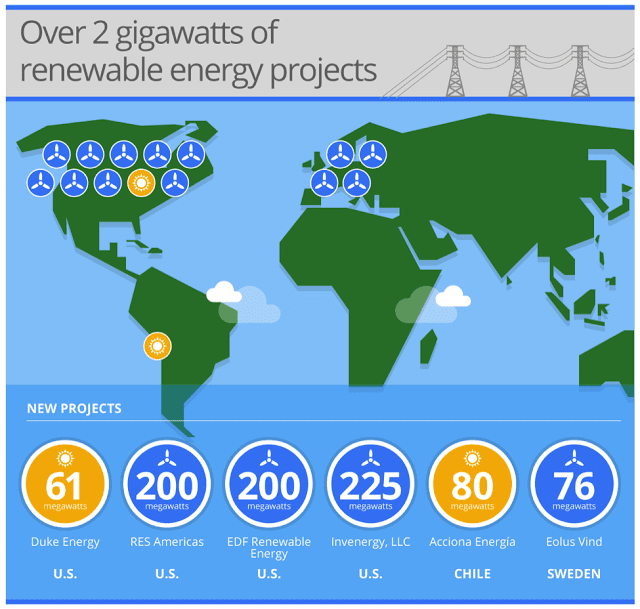Senior executives from global internet giants Google and Facebook say that renewable energy is now a valid economic alternative, and more companies could and should be following their path to 100 per cent renewable energy.
Google announced last week that it would commission another 840MW of renewable energy, taking its total capacity to more than 2GW, making it the largest corporate buyer of renewable energy in the world.
It expects to be providing 100 per cent of its needs from renewables for its operations, which include 14 data centres, within a few years.
Google has been carbon neutral since 2007, but this relied heavily on carbon offsets, so it set itself a target of 100 per cent renewables.
“We will likely be 100% renewables over next several years,” said John Woolard, the vice president for energy for Google.
Woolard, speaking at the Re-energising the Future conference on the sidelines of the Paris climate talks, says the costs of wind and solar have fallen dramatically and will continue to fall.
“Those cost curves have gone down dramatically. It is now economically attractive based on its own merits, but only in certain locations,” Woolard said.
Bill Weihl, the head of sustainability at Facebook, agreed, and indicated that this would influence where the company did business.
“We are unlikely to go to region where we cannot get access to clean energy,” Weihl said. Facebook currently sources 25 per cent of its needs from renewable energy, and has a 50 per cent target for 2018.
Facebook is involved in a partnership with WWF, the Rocky Mountain Institute and others to urge other companies to adopt similar targets.
“We have just gotten started in it,” Weihl said, but it was clear that many companies “don’t know what to do.”
“Other businesses need to understand is that it is so much more possible (because of cost reductions). The key is to decide whether you want to do it.
“You don’t order it online. It takes work to achieve it. It is very doable, and more companies should step up.”
One of those stepping up is La Poste, which this year became the first French company to announce it would source all its electricity needs from renewable energy.
So far, it supplies around one third of its needs from 45 solar arrays on the rooftops of its distribution centres. It also has plans for 10,000 electric vehicles.
Both Google and Facebook underlined the importance of innovation.
Google’s Woolard said more work was needed to reduce costs of the technologies needed to integrate renewables into the grid, and ensure its reliability and resilience
“We have a really big job in front of us, which is to change the energy infrastructure of the entire world in the next 20-30 years. We can’t do that only with the technology we have in front of us today,” Woolard said.
“We do need innovation. We need enough money going into basic research, and we need to keep deploying the technologies we have.
“A lot of innovation happened in wind and solar because of their economies of scale. That gives us cost reductions but we need, as well, investment in radical breakthroughs. We need both.”











